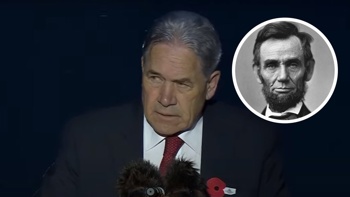UPDATED 9.34am The Productivity Commission is toying with the idea that secondary school students begin a savings fund for university.
LISTEN ABOVE: Labour education spokesperson Chris Hipkins spoke to Rachel Smalley
More details are being revealed from a Commission report released this morning that says the tertiary education needs a shake up.
Recommendations in the 400-page draft include adding interest to student loans, different forms of funding, and scrapping the University Entrance certificate.
It comes as the country's student loan debt approaches $15 billion.
Commission Chair Murray Sherwin said instead of getting into debt with universities, interest would be paid to students on these accounts.
He said the 'Student Education Account' would begin when the student turns 16 and could save around $45,000 for their chosen tertiary education.
MORE: Murray Sherwin, Alistair Shaw: The possibility of student loans with interest
The idea of putting back the interest on loans has been pulled apart by politicians in parliament.
It's been categorically ruled out by Tertiary Education Minister Steven Joyce and he isn't mincing his words on the subject.
"No, we've made that clear that we won't be putting interest back on student loans, and I've read the report myself and seen nothing in the report that would change my view on that."
Labour education spokesperson Chris Hipkins said putting interest back on student loans would just create more inequality, particularly in access to further education.
"If that's the only answer that people can come up with for funding changes in the tertiary education system, then they need to think more creatively than that."
Mr Hipkins said the country's nearly $15 billion student debt mountain is a huge problem but adding to that mountain for the individual will make it worse.
He said the reason people need a student loan in the first place is because the cost of living and the cost of fees are continuing to rise.
Green Party tertiary education spokesperson Gareth Hughes is also outraged at the suggestion, saying it's already hard enough to pay back a loan on the average salary.
"I think it's outrageous, it's ridiculous," he said. "I think we want to see an innovative system, but we don't want to just bandy about the word 'innovation' for innovation's sake. We need to keep our eye on the prize, which is tertiary education is a public good."
The draft report also includes recommendations for a switch to a voucher-type funding model.
Hipkins is blasting that as deregulation and privatisation in disguise. He said the sector does need to become more flexible, but not like this.
"The model that the Productivity Commission have proposed is going to reinforce the problems that they've identified, rather than fix them."
Also among the recommendations, the report noted that there is strong quality control, everywhere but quality of teaching.
Joyce said that has caught his attention.
"But I think in terms of really big changes, I think you'd have a pretty high bar for that given what is actually a well performing system relative to the rest of the world right now."
The idea of abolishing the University Entrance students receive at high school is also being raised in the report.
Commission Chair Murray Sherwin said over the years the qualification has become defunct.
"It's not really used as university entrance in many respects - for lots of courses universities set higher standards than UE and there are other universities that would happily take students without UE into some programmes."
Mr Sherwin said the qualification can also indicate to a student they're off to university when they may be better suited to a polytechnic institute.
Meanwhile the New Zealand Union of Students' Association says students won't like the idea of putting interest back on student loans.
Association Director Dr Alistair Shaw said adding the interest back on loans and creating the accounts won't solve the problem.
He said giving the power to students as consumers instead of as learners is going to increase the vulnerability and bad practices that we already have in the system.
Take your Radio, Podcasts and Music with you









